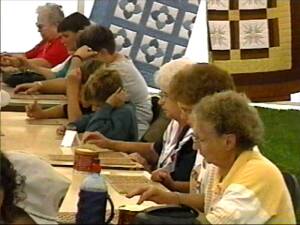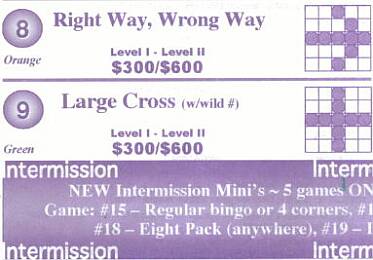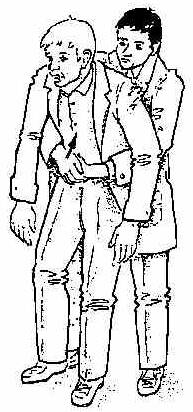The Numbers Game
The Lingo of Bingo
Bingo. If you’re like me, the word conjures up images of seaside amusement arcades, largely populated by blue-haired old ladies. Sure, in Britain, there are bingo halls, but has anyone you know ever been in one? Still, our step-daughter Vanessa had been commissioned by her boss to investigate the game at a local casino – for reasons which, being honest, still remain kinda obscure to us. But it was a quiet Friday, and the prospect of spending the afternoon gambling at someone else’s expense, is not to be sneezed at. Sure, we’d prefer high-limit poker, but we’ll take bingo, if necessary.
So we headed out, only vaguely knowing what to expect. “What if there’s just the three of us playing?”, asked Vanessa. At 12:30 on a very pleasant Friday afternoon, it seemed like a valid question. At least, it was until we walked into the aircraft hanger which is the bingo hall at Fort McDowell Casino, and saw row upon row of players – and this was before the games had even started. We realised we would be far from alone. Except that is, alone in being born in the latter half of the 20th century.

Yes, while bingo in the UK struggles to escape the stereotypes, in the US, no such attempt is made and this is a game played by the near-dead. You may think I exaggerate, but I’m not joking when I say that we saw several people attached to oxygen tanks. This is probably partly because it is a remarkably cheap form of entertainment, and since you pay up front, you know in advance exactly how much you’re going to lose. We splashed out and bought the Level 2 books, which cost more and double the amount paid out, but you could play an afternoon session for as little as $5, and that would last a good three hours. Add in the free drinks and cheap food, and you have something that compares very favourably with, say, the cinema.
However, can’t say we found it a very social experience. There’s not much breathing space between the games, just enough time for them to check the winner’s card, and then it’s straight on with the next one. Even the games themselves were scarcely leisurely experiences: our buy-in got us eight cards per game each, and, especially at first, we struggled to keep up. Ten minutes in, I was feeling like a lab-rat, daubing out numbers in exchange for the slim chance of winning a piece of cheese.
And not all that big a piece of cheese either, especially in comparison to Britain, where jackpots are competed for across the whole country, and can create instant millionaires. Most games here had a maximum of $600, and if more than one person called “Bingo!” on the same number, the prize was split. Other differences: grids were five by five, with the center square a freebie always covered, and the numbers only went up to 75, rather than 90. No “two little ducks” either.

Adding to the complexity, we anticipated simplicity: play until someone gets five in a line, then go on to a big prize for the first to cover all their numbers. I think only one game was like that: instead, presumably to speed things up, you had to get a small subset of your numbers. For example, the four numbers in the top-right of your card, plus the left hand column and bottom row. These even had special names; that one was the “Love Letter”. There was also the “Hamburger”, the “Crooked Bow-Tie”, the “Semi-Erect Penis” and so on (okay, I made the last up), some of which could occur in more than one way.
And they had wild cards – one game, everything ending “9” was a freebie, in another it was every even number. So you had you to cross off numbers before the game, then as they were called, and then had to look at the resulting Pointillist abstraction, and try to work out if you were close to a winning combination. If so, the 2% of your brain not already burning up was then allowed to start getting excited.
Thank heavens for the little old lady sitting next to us with her husband, who took pity and explained what the hell we were supposed to do with the million pieces of paper in our game pack. She had the endless patience of a grandmother, serenely playing away, even as we quizzed her during the games (a serious breach of bingo etiquette, I’m sure). Without her, we’d have been dead in the water.

Speaking of “dead”, there was a scary moment at one point. We heard cries for help coming from another table, and paramedics (no doubt permanently on standby) rushed to the assistance of a player who was choking. “Ah, so that‘s the Heimlich maneouvre…”, I thought, having only ever learned it theoretically in my St. John’s Ambulance class. As Chris pointed out, not certain you’re supposed to lift the victim bodily into the air, but it clearly did the trick, and fatality was averted.
Two things impressed me: one, the rest of the players hardly noticed – must be an almost everyday occurrence, when you have several hundred old folk operating in a state of high tension for several hours. Even more amazingly, the victim went right back to her game. This did draw appreciative nods from the players around us – she was truly hardcore. Personally, if God dropped a bomb like that on me, I’d have taken it as a hint that this was not my lucky day.
Though given the frequency of good-luck charms throughout the hall, no-one was trusting to mere fate. Our deficiencies in this area are perhaps why it wasn’t our lucky day either. Chris let out a stifled shriek of “BIN…!” at one point, but that turned out to be a false alarm, and was rapidly converted to a clearing of the throat. Still, by the end, we were daubing away with the best of them, and indeed, were so into it that we were even discussing the possibility of a return visit. Now, we at least have a clue…